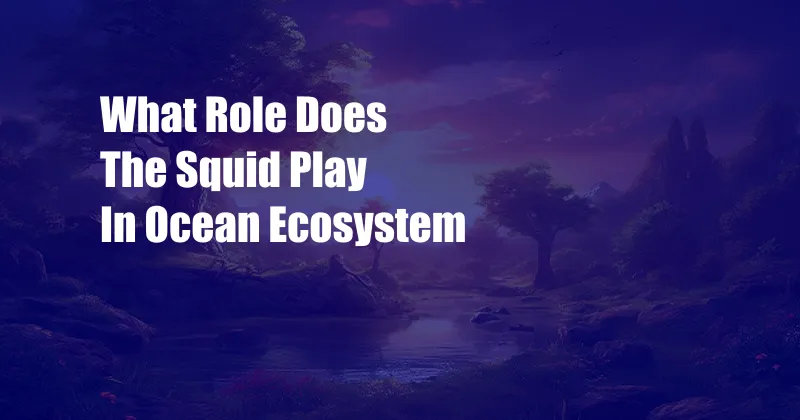
The Squid: Master of Disguise, Culinary Delicacy, and Ecological Keystone
As I observed the rhythmic undulations of a colossal squid’s tentacles through the deep-sea window of a submersible, I couldn’t help but marvel at the enigma that is this cephalopod. Its sleek, silvery body, adorned with bioluminescent organs, seemed to dance before my eyes, a mesmerizing display of nature’s artistry.
Squids, along with their relatives cuttlefish and octopuses, belong to the diverse group of marine invertebrates known as cephalopods. Their unique anatomy and remarkable abilities have captivated scientists and ocean enthusiasts alike. As I immersed myself in the captivating world of squids, I discovered their pivotal role in the intricate tapestry of the ocean’s ecosystem.
Squids: The Elusive Predators of the Deep
Squids are carnivorous predators, utilizing their sharp beaks and powerful muscular arms to capture and devour prey. Their streamlined bodies and lightning-fast reflexes make them formidable hunters in the vast expanse of the ocean. They primarily target small fish, crustaceans, and other cephalopods, contributing to the delicate balance of marine food webs.
Beyond their predatory prowess, squids possess an arsenal of remarkable defensive mechanisms. They have evolved an astonishing capability to camouflage themselves, changing their skin color and texture to blend seamlessly with their surroundings. When threatened, some species can emit a dense cloud of ink, creating a visual barrier that confuses predators and allows them to escape.
Masters of Disguise and Culinary Delicacies
Squids’ exceptional camouflage abilities have made them renowned masters of disguise. They can alter their appearance with astonishing precision, mimicking the patterns and colors of their environment. This adaptation not only enhances their hunting success but also serves as a protective defense against potential predators. Their ability to blend into their surroundings is truly a testament to the remarkable evolutionary adaptations of the marine world.
In addition to their ecological significance, squids have long been prized as a culinary delicacy in many cultures around the world. Their tender, slightly sweet meat has earned them a place on menus in both traditional and contemporary cuisine. In countries like Japan, Italy, and Spain, squids are a staple ingredient in beloved dishes such as sushi, pasta, and paella.
Ecological Keystone Species
Squids are not only fascinating creatures in their own right but also play a crucial role in the ocean ecosystem. As apex predators, they help regulate populations of their prey species, ensuring a healthy balance in marine food webs. Moreover, squids serve as an essential food source for larger marine predators, including fish, sharks, and whales.
Squids’ role as a keystone species extends beyond their presence in the food chain. As they feed on smaller organisms, they consume indigestible hard parts such as shells and exoskeletons. These undigested materials are then released back into the water column, providing a valuable source of calcium for other marine organisms. This process contributes to the cycling of nutrients and the overall health of marine ecosystems.
Exploring the Frontiers of Squid Biology
The scientific study of squids continues to unravel the mysteries surrounding these remarkable creatures. Researchers have made significant advancements in understanding their complex behavior, reproductive strategies, and ecological interactions. Advanced imaging techniques have provided insights into their intricate nervous systems, revealing their capacity for complex problem-solving and learning.
Ongoing research also focuses on the impact of climate change and pollution on squids. As ocean temperatures rise, squids are venturing into new habitats and potentially competing with other marine species. Scientists are closely monitoring these changes to assess the resilience and adaptability of squids in a rapidly evolving ocean environment.
Expert Advice for Squid Enthusiasts
Whether you’re a seasoned diver or simply fascinated by the wonders of the deep, there are few things more thrilling than observing squids in their natural habitat. If you’re planning a snorkeling or diving excursion, it’s essential to prioritize the welfare of these creatures. Keep a safe distance, minimize noise, and avoid touching or chasing squids to prevent any disruption to their behavior.
For those interested in enjoying squids as part of a culinary experience, choosing sustainable seafood options is crucial. Look for squids that have been harvested from well-managed fisheries using responsible practices. By making informed choices, you can help preserve squid populations for future generations to enjoy.
FAQs about Squids
- What is the lifespan of a squid?
The lifespan of a squid varies depending on the species, but most have a relatively short life expectancy. Some species live for only a few months, while others can survive for up to two years. - Where are squids found?
Squids are found in oceans worldwide, from the shallows to the deep sea. They can be found in both tropical and temperate waters. - Are squids dangerous to humans?
While squids are not typically aggressive towards humans, some species can be venomous. However, their venom is not usually fatal to humans. - What are the benefits of eating squid?
Squids are a good source of protein, omega-3 fatty acids, and vitamins. They are also low in calories and fat. - How can I support squid conservation?
You can support squid conservation by choosing sustainable seafood options and reducing plastic pollution in the ocean.
Conclusion
Squids, with their captivating beauty, remarkable adaptations, and crucial ecological roles, are a testament to the boundless wonders of the underwater world. Whether observed through a diver’s mask or savored in a culinary masterpiece, these enigmatic creatures continue to inspire awe and admiration.
If you have been captivated by the captivating world of squids, I encourage you to explore further. Attend a local aquarium exhibit, delve into scientific journals, or simply spend time observing these fascinating creatures in their natural habitat. By deepening our understanding and appreciation for squids, we not only enrich our own lives but also contribute to the preservation of these extraordinary marine marvels.